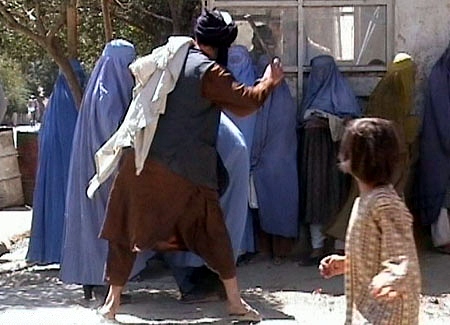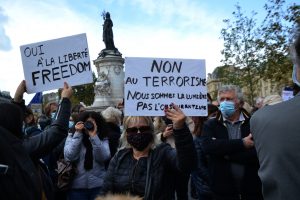By Vareen Ismail
Why does everyone seem to hate France? It is the home of great wine, food, and literature. It is the birthplace of enlightenment values of liberty, equality, and fraternity. It is one of the freest, democratic societies in the world with full emancipation of women and sexual minorities. People routinely make perilous journeys in dingy boats through an underground sordid network of people smugglers to live a new life of peace and security in France.
Yet you would not know that from France’s portrayal on social media. There are various Twitter and Instagram accounts with a line slashed through the tricolour French flag or comically blocked out. France has been cancelled.
What is the Country of Love’s horrific crime that has elicited the anger of so many people? The ‘crime’ is the French government standing up to the onslaught of Islamist terrorist attacks that have killed 260 ordinary French citizens since 2012, including the 120 victims of the deadly Charlie Hebdo attack in 2015. For a country that is not, by any stretch of the imagination, a war zone, that is a horrific number of civilian deaths.
The most recent and most shocking attack on French values was the 2020 execution of the middle-school history teacher Samuel Paty. He was beheaded by Abdoullakh Abouyedovich Anzorov an 18-year-old Muslim refugee of Chechen origin. Paty showed his class the ‘blasphemous’ Charlie Hebdo cartoons of the Prophet Muhammad in an effort to teach them about free speech.
There was also a social media hate campaign orchestrated by Abdelhakim Sefrioui – a preacher at the mosque Anzorov frequented – who was known to French intelligence services for years, due to his Islamist leanings. He posted videos on Facebook, where he reportedly insulted Paty and demanded his suspension.
In response to the cold-blooded murder of the high school teacher, the French government projected the images onto government buildings, reaffirming the French government’s commitment to free speech against archaic blasphemy laws. It showed that France would not bow down to the demands of Islamists.
This, naturally, angered the Muslim world. Various leaders, and prominent online influencers, called for a boycott of French goods that #BoycottFrance was trending on Twitter globally. In Kuwait, for major supermarkets withdrew French products, while Turkish President Erdogan urged his citizens “don’t pay attention to French brands, don’t buy them.” The attempted boycott did not have much impact on the world’s seventh largest economy because the Middle East only represents three per cent of French exports.
Instead of focusing on superficial boycotts, perhaps the self-styled leaders of the Muslims should be more vocal on real instances of anti-Muslim bigotry, such as China’s treatment of its Uighur Muslims.
And it is worth pointing out that Islamists kill overwhelmingly more Muslims and cause considerably more damage in Muslim-majority countries. Offshoots of ISIS have orchestrated a number of attacks on Sufi mosques in Egypt, because they are the “wrong type of Muslims”. The Taliban recently killed Hazara Shias, a community that has historically been oppressed by the Sunni majority in Afghanistan.

Instead of focusing their ire on such terrorists, ‘Muslim Twitter’ chose to lambaste France, suggesting the country was almost as bad as Afghanistan in its treatment of women.
The comparison of the French government, an internationally recognised body of law and power, to the Islamist insurgents, is a joke. It makes a mockery of the oppression that women face in Afghanistan. Even though the Afghanistan of a few months ago was hardly a paradigm, it was infinitely more preferable than the Taliban-controlled country today, which now styles itself as the “Islamic Emirate of Afghanistan”. Female newscasters have been replaced by male newscasters.
In France there are multiple female newscasters and journalists who are respected by their peers and are able to ascend to the highest levels of their profession. Some of them are even gay. This would be unthinkable in most Muslim-majority countries, not just Afghanistan. Tunisia, which is the most democratic of them, gives three-year jail sentence to people accused of homosexuality.
Therefore, portraying France as a totalitarian state that is out to get its minority Muslim population is categorically untrue. While France may not be perfect – which country is? – it treats it’s Muslim minority population far better than the governments of Muslim-majority countries treat their respective minority populations.
The prevention of Muslim girls from going to school has nothing to do with the French government and everything to do with deeply conservative Muslim parents who have an issue with the French policy of laïcité (secularism). Of course, opponents will argue that this is unfair to Muslim girls who want to wear a hijab in school, while advocates of the ban – which prohibits all religious symbols such as the Jewish kippa or Christian crosses in public institutions – will say this treats everyone equally.
And so the Muslim parents opt to home-school their daughters, rather than allowing them to go to school without a headscarf. This, they argue, protects them from discrimination, racism, and Islamophobia by hostile French public schools. In actuality, this isolates these girls from receiving the necessary qualifications to go onto university, achieve independence and becoming productive members of French society.
Currently there are 50,000 children who are home-schooled in France. According to the Interior Minister Gerald Darmanin in some areas there are more boys than girls in schools. Macron has announced plans to ban home schooling and give parents who are found guilty to six months in jail and a 7,500 euro fine. Every child in France will be given an identification number to enforce the ban. This is just one of the proposed laws unveiled by Macron’s government to combat Islamist separatism after the murder of Samuel Paty.
Naturally, these strict policies will also curtail the freedoms of parents to choose the best method of educating their children – whether that is sending them to a private fee-paying school, public school, or being home-schooled.
However, sacrifices have to be made in order to combat the problem of Islamist extremism and integrate the wider Muslim population into western society. This issue is even more urgent for France, because at 10 per cent it has the largest Muslim population in Europe.
The tepid response by Western governments, who are supposed to be allies of France, to the various Islamist attacks that have swept French society leaves much to be desired. Hardly anyone unequivocally condemned Paty’s murder.
What is interesting to note is that many French Muslim leaders do support their government’s efforts to combat Islamist extremism, expressing their support of laïcité and insisting that there is no official discrimination towards Muslims. A a number of French Muslim intellectuals and faith leaders condemned the French boycott as an attempt to sow discord in the French community, and also reiterated that blasphemy is not a crime and is a freedom that should be protected – even if they themselves find the cartoon depictions of Prophet Muhammad vulgar and offensive.
President Macron has also lashed out at foreign western media who try to portray France as having a problem with Muslims and fostering racism against Muslims.
These problems aren’t confined to France. Therefore, it should not have come as a surprise when, across the Channel in Britain, there was a protest organised by Muslims in Yorkshire, after a religious education teacher at Batley Grammar school showed the Charlie Hebdo cartoons of the Prophet Muhammad. The teacher was thankfully not killed, but has since gone into hiding in an undisclosed safe house fearing for his life. Most shameful of all is that he was not given support from either his union or his own school.
Further demonstrating the problem around this debate, the Muslim Labour MP Naz Shah stood up in parliament saying people should understand how drawing degrading cartoons of the Islamic prophet is wrong. She was, in effect, advocating for blasphemy laws in a free and democratic society.
Western Governments like Britain should not capitulate to the demands of Islamists. They should stand with France in solidarity and defend the important value of free speech, which is one of the foundational bases of any democratic society, regardless of whether it causes offence.
It is important that we prevent any more attempted future killings of people who practice the right to criticise, express, and to draw their objections to religion. Ideas should not be protected from scrutiny, but should instead be challenged.
France is trying to defend Enlightenment values – which is more that can be said for most Western countries. The ridiculous comparisons of France to the Taliban reflects poorly on Muslims who proliferate this argument. Instead of demonising France and spreading nonsense accusations, they should focus on Muslim countries that are actually violating even basic human rights
* Main Pic Credit: Rally in Paris after the murder of a teacher (Samuel Paty)
Jeanne Menjoulet / Flickr

Vareen Ismail is a British Kurdish woman. She is an atheist and passionate about secularism, women’s issues, democracy and free speech. She is an aspiring journalist and writer. When she is not writing articles about current affairs and culture you can find her on a park bench with her nose in a book (most likely Pride and Prejudice).

